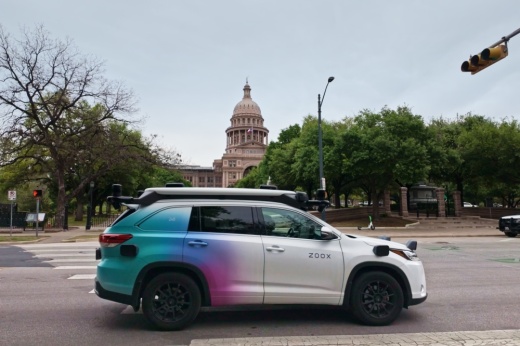Austinites may notice the colorful rear ends of newly retrofitted Toyota Highlanders driving alongside traffic this month.
Automated transportation company Zoox announced in June they will begin fine-tuning their self-driving vehicles in Austin, beginning testing sometime late this summer.
What’s happening?
Expanding to both Miami and Austin, Zoox will be deploying its new fleet in small areas near the business and entertainment districts of the two cities, a company news release states. The company has already been testing its AI-smart vehicles in the San Francisco and Las Vegas areas.
Part of Austin’s allure stems from the area's horizontal traffic lights, wire-hanging traffic lights, railway crossings and “famous thunderstorms,” the release continues.
A driver will remain in the car during this phase of testing and rides will not yet be available for the public.
Looking back
Zoox is not the first autonomous car company to roam the streets of Austin.
Technology company Waymo announced March 5 its self-driving cars would begin testing within a 43-square-mile radius that included downtown, Barton Hills, Riverside, East Austin and Hyde Park.
Austin is the fourth city selected by Waymo, which already offers fully autonomous ride-share services in San Francisco, Los Angeles and Phoenix.
General Motors’ Cruise, another autonomous vehicle company that launched its testing in Austin in 2022, announced last October that all operations of self-driving cars would be suspended nationally until further notice.
The decision came after the California Department of Motor Vehicles suspended Cruise’s deployment and driverless testing permits Oct. 24.
In Texas, there is not much regulation for automated cars at the local level. Senate Bill 2205, passed by the Texas Legislature in 2017, amended the Texas Transportation Code with policies governing autonomous vehicles. SB 2205 put much of the oversight of these vehicles in the state’s hands, rather than local municipalities, according to previous reporting by Community Impact.
Residents and city leaders alike have voiced their concerns. Over 50 complaints were filed against Cruise before the company ceased operations, including complaints of near misses, collisions and nuisance and safety, according to the city of Austin's Transportation and Public Works department, or TPW.
“It's important for autonomous vehicle companies to realize that these driverless cars can be dangerous and that our public roads should not be a test playground,” Austin District 8 Council member Paige Ellis said Oct. 27, after the Cruise announcement. “We should not be treated like guinea pigs.”
A total of 56 complaints have been filed related to autonomous vehicles, according to TPW.
Looking ahead
Zoox has been vocal about its dedication to working closely with local officials, regulators and residents.
During a live update from the company on June 26, Zoox representatives spoke about autonomous vehicles as the new era of transportation.
Zoox CEO Aicha Evans said that self-driving cars can help increase access to mobility options for all, including underserved communities.
“We constantly—at Zoox—talk about where is the demand that's underserved, and how do we serve that?” Evans said. “... This is at the core of who we are.”
Ron Thaniel, a senior director of policy and regulatory affairs for Zoox, shared that his family did not have access to a car when he was growing up, which for many in similar situations may limit their opportunities for a better life.
Thaniel also explained that the company has worked closely with local transportation authorities to create a plan for deployment in the city.
“We want to explain to regulators who we are, what our technology is. ... We work with the community, we work with the regulators and we scale slowly,” Thaniel said. “[Our approach] is a proven model that is based on full engagement, full transparency and no surprises with the regulator, as well as city leaders.”
TPW confirmed the company’s efforts towards local cooperation and coordination.
“Zoox has worked with the city as they have come into the market to map and test their vehicles in Austin. Although cities in Texas cannot regulate autonomous vehicles, or AVs, Austin has worked with AV companies as they enter the market to offer staff's knowledge on the local transportation network to help AVs operate more safely,” TPW spokesperson Jack Flagler wrote in an email to Community Impact. “We believe AVs have the potential to enhance the safety of our streets, and we work with AV companies to ensure deployments are done thoughtfully to ensure minimal risk.”
More information is available at the city's autonomous vehicle website, www.austintexas.gov/page/autonomous-vehicles.





